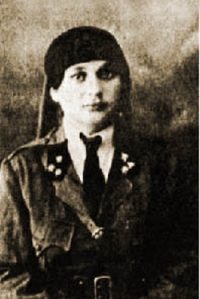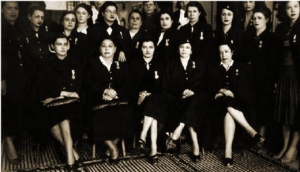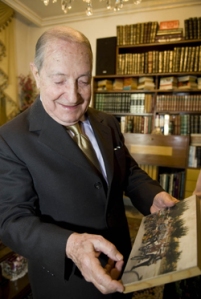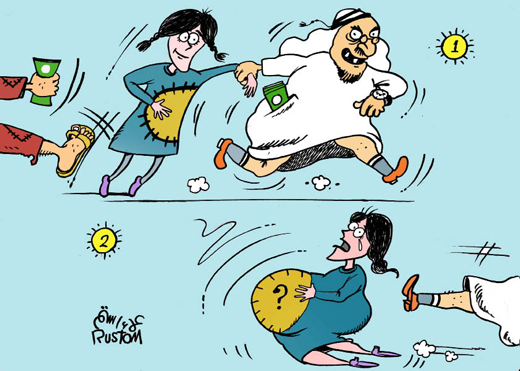The French mandate period left a lasting impression on Syria’s systems.
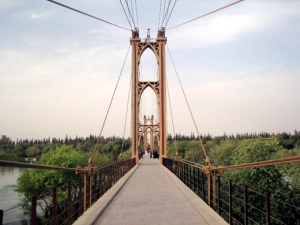
The Deir ez-Zor suspension bridge, built in 1927 by the French construction company Fougerolle.
The highs and lows of the French mandate in Syria are immediately visible to any first-time visitor to Damascus.
The impressive, French-built National Museum – a first stop for any newcomer – highlights the period’s positive impact. Conversely, the domed roof of Souk Hamidiyeh was left punctured with its iconic bullet holes during the 1925 air raid combating a civilian revolt. The French response to the Syrian uprising killed 5,000 citizens and made Damascus, according to US professor and Middle East expert Michael Provence, the site of a dark legacy: the home of “the first civilian carpet bombing campaign ever”.
In addition to these and other visible vestiges of the period between 1920 and 1946 when France administered Syria through a mandate from the League of Nations, numerous intangible fingerprints touch Syrian education, law and culture.
More than 65 years since the French left Syria and the country became an independent Arab republic, the French legacy remains.


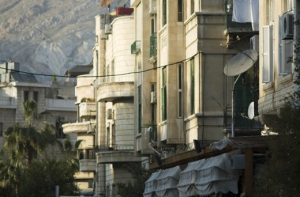
French-built apartment blocks in Damascus (top); buildings in Aleppo that were built either in the Late Ottoman period – when architecture began to be influenced by Italian and to a lesser-degree French styles – or during the French mandate (middle, bottom) photos by Adel Samara and Claire Duffett
Educational impact
Every spring, secondary school students throughout Syria agonise over the Baccalauréat graduation examination that will determine their qualifications for attending university. During this time, newspapers print numerous stories about students committing suicide because of test anxiety.
Although after independence, the Syrian educational system was nationalised and the curriculum adapted from French into Arabic, certain trademark characteristics of education implemented by the French during the 1920s remain – most obviously the Baccalauréat.
“It remains a huge rite of passage – rightly or wrongly – that can define your entire future,” said Nadya Sbaiti, a professor of Modern Middle East at Smith College in the US. “That’s directly related to the French mandate for sure.”
Under the mandate, the Baccalauréat was implemented and eventually became the demanding ordeal that it remains today, after the French discovered that too many young Syrians were passing the test, Sbaiti explained. In order to reserve government and specialised professions – particularly medicine, law and finance – for French residents of Syria, the examination was made more difficult.
“The whole point was to prevent Syrians from going into these professions,” she said.
Today, the Baccalauréat has evolved, but it remains a high-profile filter that determines who can obtain an affordable education – with thousands more young people finishing secondary school annually than there are spots available at public universities.
Likewise, the French school in Damascus still provides lucky individuals with additional opportunities. While nationalised in 1967, it is an expensive, private-tuition institution to which only the most well-connected Syrian students have access.
“It’s definitely part of the elite culture,” said Randi Deguilhem, a France-based professor at the Institute for Research and Study on the Arab and Muslim Worlds. Wealthy Syrians and children of diplomats attend the school, she said, which is “a clear sign of socioeconomic status. It’s not just the knowledge [learned there] itself, it opens the door to economic opportunities.”
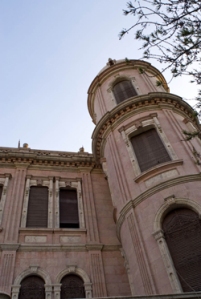
Villa Rose, a mansion in Aleppo built during the French mandate
Legal tradition
Syria’s legal system – its foundations and some of its high-profile hallmarks – remain rooted in the country’s French background. Syrian law is derived from legislative statutes that follow the French civil law system.
French law first arrived in Syria long before the mandate period. In 1858, the Ottomans, who occupied Syria for 400 years through 1918, replaced its sharia-based legal system throughout its empire – as part of a push towards westernisation –with a criminal law system modelled on France’s, Farouk al-Basha, professor of law emeritus at the University of Damascus, explained.
Later, during the mandate, Syria also adopted France’s civil, commercial and administrative legal systems. While the changes made Syrian law clearer – going from complex sharia to straightforward statutes – according to Basha, a number of oft-criticised laws are derived from the French.
For instance, women under sharia had full citizenship. Only under the French were they stripped of full citizenship rights, Elizabeth Thompson, associate professor of history at the University of Virginia and chair of the workshop on Muslim societies, explained. Women became subjects of their husbands and fathers and lost the ability to pass down Syrian nationality to their children. The latter is a restriction that persists until today in Syria, but was dismissed by the French in 1965.
Furthermore, the law granting lenient sentences for ‘honour killings’ – when men murder their female relatives over alleged sexual impropriety – can be attributed to the French system, despite the phenomenon often being attributed to conservative, eastern beliefs and assumed to be part of sharia. France delineated a now-defunct law in its 1810 criminal code which refers to ‘crimes of passion’, absolving men of responsibility for murdering a female relative if he catches her in the act of adultery. Basha explained that, in contrast, sharia stipulates that four sheiks must simultaneously catch a woman in the act of adultery – a virtually impossible scenario.
The Syrian government also learned a few extra-judicial habits from the French, argued US professor Provence. Syria’s long-standing emergency law, which suspends the constitutional rights of certain individuals, is in part modeled on the permanent presence of marshal law under the French mandate, he argued.
“The big vestige of the French mandate are the intelligence services and marshal law,” he said. “The Syrian government learned disregard for [some aspects of] the rule of law from the French.”
Thompson, the associate professor of history, agreed that various governments in the region learned disregard for citizens’ rights from their former administrators, saying: “Nation-building during occupation is profoundly anti-democratic.”
Cultural heritage
More than education and law, French culture is perhaps the most visible – and positive – mandate legacy in Syria today. Throughout March, the embassy of France and other French-speaking countries hosted the Days of Francophonie: a series of films, lectures, exhibitions and concerts. The French Cultural Centre in Damascus and the French Institute for the Near East are two of the most active cultural centres in the region, said Eric Chevallier, French ambassador to Syria.
“More than events, we have long-term relationships on various key issues,” he added, including academic exchanges with more than 3,000 students and a project for the Louvre in Paris to help upgrade the Syrian National Museum.
In academia, a number of Syria’s most prominent thinkers learned from philosophies that originated in France, Ghassan al-Sayed, vice dean of the Higher Language Institute at the University of Damascus, said.
For instance, the French literary schools of existentialism, deconstructionism, and idealism all influenced numerous high-profile Syrian writers, including the poet Adonis, the deconstructionist Kamal Abu Deeb and the Christian existentialist George Salim.
“All the Syrian thinkers studied in French universities in Syria during the mandate,” Sayed said. During the post-independence 1950s and 1960s, they traveled frequently between Damascus and Paris, and eventually established Syrian-flavoured versions of French philosophies, Sayed said.
For instance, existentialism argues that man is free to make his own choices and must therefore be committed to those choices, he said. The Syrian existentialists – noting the importance of community in their country – extended this idea, arguing that the philosophy includes an inherent choice to be committed to one’s fellow citizens.
He explained: “They took the French concepts and adapted them, in order to acknowledge the Syrian reality.”
This article was written by Claire Duffett in Syria Today magazine. I helped reporting about French influence on Syria’s legal system.





